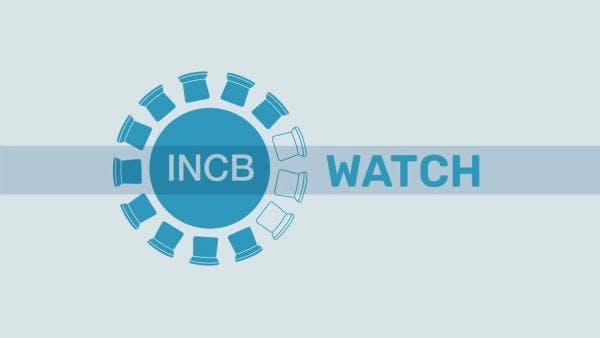INCB discusses the international drug control conventions at UNGASS 2016
At the April 2016 UN General Assembly Special Session on the world drug problem, the INCB held a side-event entitled ‘The drug control conventions: a multi-faceted framework for the promotion of the health and welfare of humankind’.
The INCB President Werner Sipp was accompanied by other Board members: Bernard Leroy, Jagjit Pavadia, Richard Mattick and Sri Suryawati. President opened the event by speaking of the health-oriented and enabling role of the conventions, and expressed a welcome to all those governments who have shifted their drug control policies in this direction. In their presentations, the various Board members went on to emphasis proportionality of sentencing, access to controlled medicines while preventing diversion, NPS, and medically-based drug treatment. There were also wide-ranging discussions in response to questions from civil society dealing with reform of the conventions, cannabis, scheduling and others.
The Canadian SSDP, for example, described the existing drug control paradigm as ‘inherently abusive’, and asked if, in the opinion of the Board, it will ever change. President Sipp replied that it is up to member states to make changes to the international drug control system. For the INCB, he said, the conventions are binding, and they state that drug must be restricted to medical and scientific purposes. Bernard Leroy added that the term ‘medical’ is not defined in the conventions, and is interpreted by member states. Dr Richard Mattick noted that if the conventions do change, such a change is likely to be limited, as governments would have to accept the use of drugs outside the medical and scientific uses stipulated by the current conventions.
A dialogue followed on ensuring access to controlled medicines. Katherine Pettus of the IAHPC complimented the work of the Board in this area, but called for redoubled efforts. Werner Sipp stated that counties must improve the legal situation, to reduce the regulatory boundaries that can block the supplies of controlled medicines to those who need them.
Overall, the INCB engaged in a productive discussion with civil society organisations, and its attitude at this event was highly promising compared with that demonstrated often in recent years.
Keep up-to-date with drug policy developments by subscribing to the IDPC Monthly Alert.
Thumbnail: INCB.org
Regions
Related Profiles
- International Narcotics Control Board (INCB)
